This article was first published in ‘White Print’ – a braille magazine for the visually impaired, founded and published by Upasana Makati.
When the seven notes of music are your companions since you were in the warm and soothing womb of your mother, the outside world automatically takes a musical shape. The atmosphere around and within you is full of love, and as Rumi says, “In the house of lovers, the music never stops, the walls are made of songs and the floor dances”.
The rustic and unique voice behind many melancholic, soulful and now playful romantic songs, is a lady whom I had the privilege to meet last month. Seated amidst the aroma of several musical instruments, tapes, cassettes, was a lady with a distinct personality just like her voice.
While Lakaad from Omkara touches or rather moves the inner soul, Kabira brings tears to eyes of lovers, Namak Ishq ka and Ghaghra are sure to make you dance, but Phir le aya dil from Barfi leaves a sugary smile on your face. A sufi, Bollywood and Ghazal singer, Rekha Bhardwaj is the beautiful person I just musically defined.
A Life Deeply Rooted In Music
She muses, “Music is my lifeline. Just the way you breathe naturally, it is my breath. I don’t feel I’m alive if I do not sing, do my riyaaz and listen to music. It is very dear to me; it is a prayer for me. It is the purest thing I can feel.”
Reminiscing, Rekha-ji says, “The atmosphere at home was musical. My father always wanted to learn music but his parents didn’t allow him to do so since it wasn’t considered respectable at that time. He used to do Parsi theatre but his parents made him quit everything. He was passionate about it and was determined to teach his children and wife after marriage. He was a very progressive personality. Just as he had thought, he made my mom learn music too. Just by making her listen to rich, pure classical music, he had trained her beautifully. They even attended several concerts.”
She continues, “My elder sister Usha didi learnt music from Gandharva Mahavidyala. My eyes and ears opened to her divine riyaaz with the tanpura at 4.30 AM in the morning. I learnt music from her. After she got married I joined the Mahavidyala and learnt there for eight years. It had become my home and another family. I joined the choir and attended the Sunday rehearsals too. In fact, that was one place my father never refused to let me go. We had really enjoyable night stays followed by early morning programs on the occasion of Gandhiji’s birthday, Martyr day, etc. We were expected to reach Raj Ghat by 6 am in the morning and sang Vaishnav Janto and Bapu’s favourite bhajans”.
Music And Memories
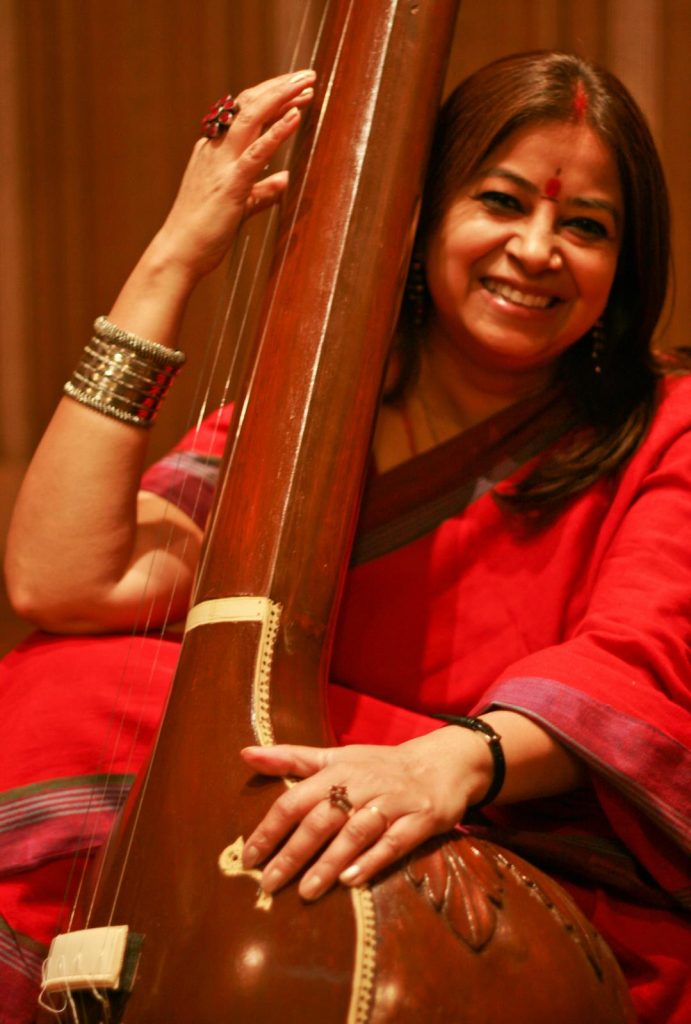
Rekha-ji’s childhood was filled with musical memories, and she says, “I was very young when I would accompany my parents to a concert. We would go in the evening and come back at 4 am in the morning. I would very delightfully sit through the concert. I do not know what I actually understood but all I remember is that I attended the entire concert. The place where the concert took place had to be reached on foot and also included crossing railway lines. I would walk halfway and the rest my dad would carry me in his arms. Birthdays at our house were never celebrated by cutting a cake”.
“A house concert would be arranged at home in the presence of my dad’s musician friends. Ghazals, thumris and other classical songs would be sung throughout the night, until wee hours of the morning. My mother, sister and I would sing too. Our entire childhood was spent hearing beautiful music. The radio could be heard from morning to night. I absolutely realise how important this training was for my musical journey and me. It has been absorbed deeply into our subconscious mind. This training and upbringing comes out each time I have to sing a song”.
Rekha-ji continued on her musical journey through college and after her marriage to Music Composer, Director, Producer, Vishal Bhardwaj. Her private album, Ishqa Ishqa, signalled her official entry into the industry.
She explains, “Before the release of Ishqa Ishqa I used to sing in serials, telefilms and also performed ghazals in Delhi. Not everyone knows that Vishal, our friend Deva Sengupta, and I released one album in 1989 through the company CPS with the use of our own money. Vishal composed and arranged the music in the album. Those were growing years and now I do realise my shortcomings as a singer in the album when I hear those songs”.
A New Chapter
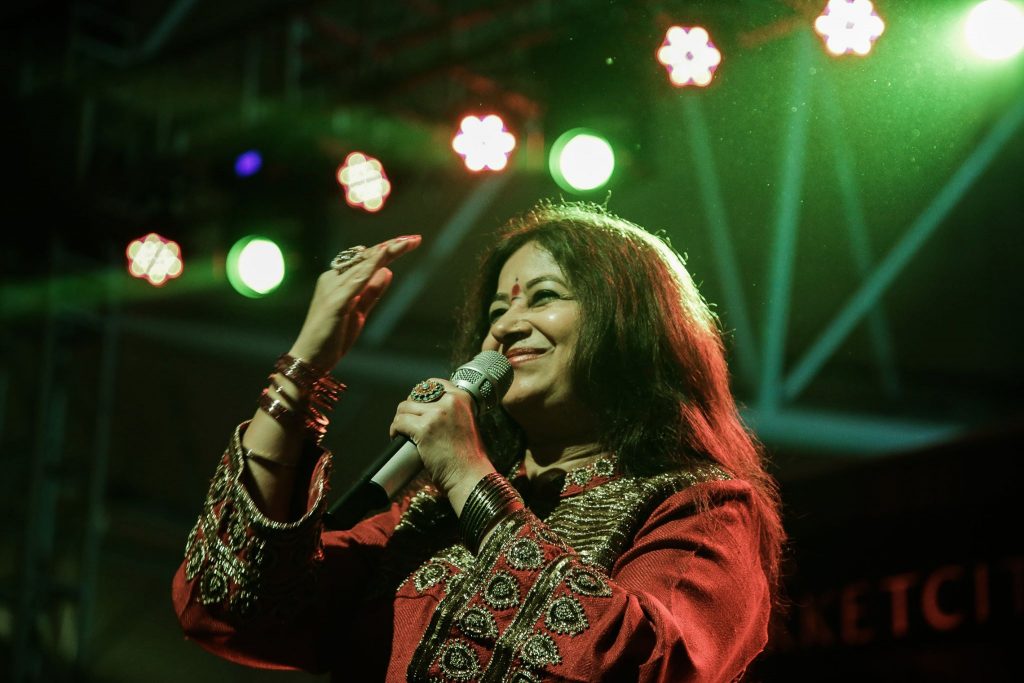
However, not everything was smooth sailing, and the Bhardwaj family experienced their own challenges when they first started out. Rekha-ji says, “I got married to Vishal in 1991, and we moved to Bombay after which the nature of our struggle changed. The common perception in the city is that if you do not sing for films, you haven’t achieved much. Films are given a lot of importance and we certainly couldn’t ignore it too. Since Vishal was a composer, we started learning the process and it was very fascinating. Eventually, I started assisting Vishal and soon I realised that playback singing was a possible option for me.”
She says, “Having said that, I also knew my limitations as a singer since I did not have a conventional high-pitched voice, which people are usually used to hearing. I was aware of the fact that people demand a thin voice for a typical romantic song to sound bright. Vishal used to hear me do my riyaaz each day and he decided to compose Kaafiyaan Bulleh Shah ki. This project, he believed was apt to showcase my classical side to the world. There would be sittings with Gulzaar saab at the same time. We made him hear one kaafi and he immediately said he would write for this project.”
“However, Vishal’s career took off at this juncture and he got busy with that. Companies would be ready to release a ghazal album but no one would actually release it. They would back out when it was actually time to record. This struggle continued for 11 years; from 1991 to 2002. In 2002 Vishal felt that finally had the money to release our own album.”
It was an all-new world for Rekha-ji, who says, “Before the album, I only sang for Vishal’s films. Whenever he would compose a song that suited my voice, he would make me sing it. I never got work from any other music directors. Ishqa Ishqa was a product of pent-up frustration and a vengeance in a way. It was an honour to have Gulazaar Saab write for me.”
She says, nostalgically, “Something that we can never forget is how the first cheque to Gulzaar Saab was given by Vishal’s close friend Krishna Kotak. After that Vishal put in his money. I must mention that this album was way ahead of its time. We actually used Shivamani for drums in the album along with keyboard programming.”
Rekha-ji elaborates, “To our surprise, after five songs of the album were recorded we approached a few companies but they did not show interest. Eventually, we released the album with Music Today. Harini from music today heard one of the songs I sang for Piyush Kanojia and she was really impressed by my voice. Piyush told her about my album and she requested that she would like to hear them. Harini loved the songs and it was finally released.”
The Beautiful Answer
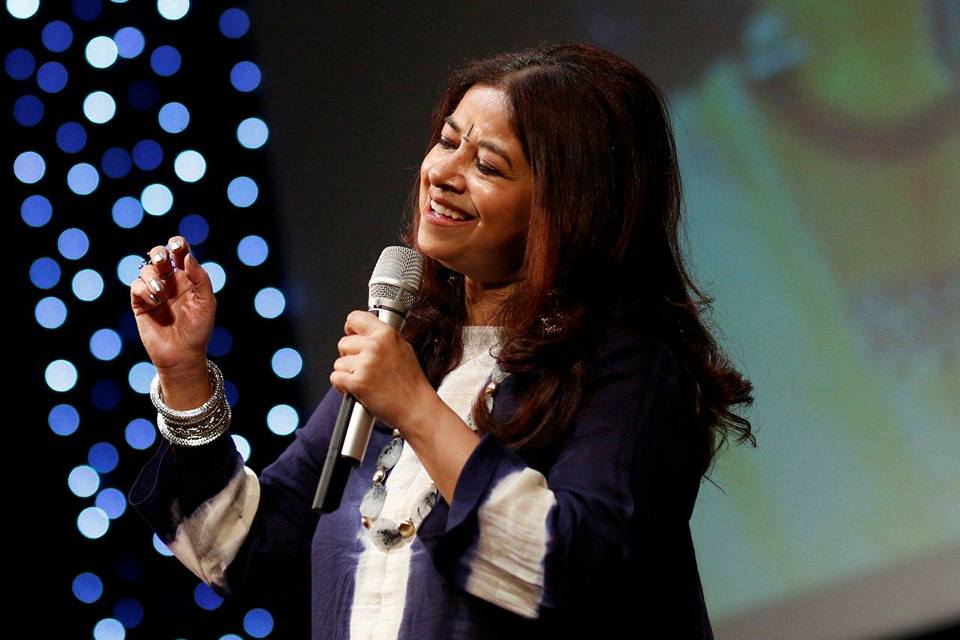
A long struggle is certainly followed by a new phase of life, a happier one indeed. Something similar happened in the life of Rekha Bhardwaj. A new life, a new beginning.
She says, “The release of the album made me feel contented. It was a beautiful answer and reward for all my riyaaz, frustration and hard work. With time I became professional on the mic and also learnt how to surrender as a singer through the album. I went to Osho and pursued the course on Sufi whirling dervishes and this is the point from where my inner journey began. Nusrat Ali Khan Saab, Abida Parveen among others had made Sufi music a trend in the country. This wave also worked in my favour.”
The journey of life is incomplete without a partner and companion to share the happy and dull moments with. For Rekha Bhardwaj, it was her college best friend, Vishal, who wholly filled that place and held her hand through thick and thin.
She says, “I have shared the maximum years of my life with Vishal and we have so many experiences to look back at. I’ve learnt to speak, retain relationships, other lessons of life only from him. There were many instances when while singing in the comfort of our studio at home, if I didn’t feel right about my singing, I would switch off from within. I came out of this through Ishqa Ishqa during which he used to shout at me.”
She elaborates, “I must share this memorable incident with you. Tere Ishq Mein was the most popular song on the album. In the song, a part of the antara goes into double rhythm. Since the very beginning, I have been in the habit of and felt comfort in singing slow songs. I felt I wouldn’t be able to sing that double rhythm and he gave me a scolding for it after which I could sing it beautifully. My mind opened up after that day”.
“Vishal has a habit of making me hear the song once the first two lines are composed. He likes to take my opinion regardless of him actually taking it into account or not. He made me hear Namak Ishq Ka from the film Omkara, and I made him hear a few variations in the line Jaban pe laga re with a natural high tone to it. He loved it so much that he felt I would be the perfect voice for the song.”
She recounts, “In fact, he even recorded the variations I made on his phone so that I wouldn’t forget them. Once the song kept building on, I started feeling that I couldn’t sing it. In his opinion challenging a person brings out the best in him, but for me, it was totally the opposite. My morale gets low if someone challenges me. He told me I had to work really hard and sing the song. However, subconsciously I was getting pressurised. Once the song was ready, I refused to sing it, because it wasn’t the usual melancholic and soulful song I was used to singing. Vishal argued that he had composed the song keeping me in mind and it would be impossible for anyone else to sing it. For days I kept crying and finally convinced Vishal and Gulzar Saab that I wasn’t made for the song.”
Overcoming Her Own Challenges
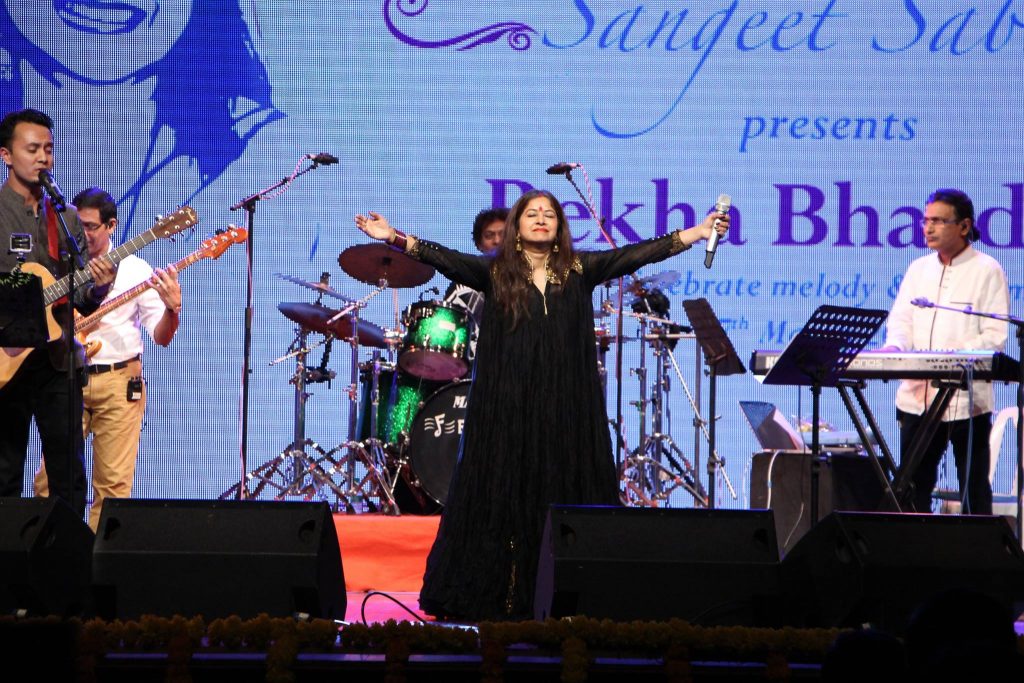
Rekha-ji continues, “After a few days, Vishal remembered that he had recorded my initial variations on his phone. He immediately heard them and forced me to start preparing for the song. I would practice and cry at the same time. He would personally make me practice the song. We sat with the dholak for two days and fixed the song part by part. He guided me all through. Vishal advised me to forget and switch off from the world while I was recording the song.”
“I had numerous things to worry about in my mind including my son Aasman who was small too. Salman, Vishal’s sound recordist, Hitesh Sonik Vishal’s assistant, had seen me right from the beginning. Somewhere I felt what would they think if I sang such a different and notorious song in front of these same people. I had to mentally prepare myself. That day for the first time I switched off myself, immersed myself in the situation of the song and got rid of my inhibitions.”
“The rhythm was recorded, Rakesh Pandit’s vocals were added which gave a lovely touch to the song. All senior musicians who were present loved my singing and appreciated me for it. Finally, I felt that something good had happened. This is definitely the most memorable incident of my life. Vishal still teases me when people demand me to sing Namak Ishq Ka”, says Rekha-ji laughingly.
This revolutionary step, opened numerous windows of opportunities for the singer. Practically every music composer wanted to work with her after this song. Another phase of the musical journey started.
She admits, “Working with other music composers in the industry has been quite interesting. I am more comfortable working with other music directors because I have to prove myself to all of them. In order to do that, I would practice the song perfectly. I must admit that I don’t put in the same level of preparation for Vishal’s songs. I do take it lightly because it is all in the house.”
Rekha-ji says, “Music directors today respect me a lot, give me the liberty to improvise on my own and also prepare the song prior to recording unlike the usual trend of learning on the spot and recording. They are sure when they call and this gives me the advantage. When the music director believes in you, then the outcome is always good”.
Celebrating A Special Connection
Rekha-ji shares a special bond with Gulzaar Saab, who was recently awarded the Dadasaheb Phalke Award. The reverence and respect she has for him is so beautifully seen through her live performances.
She explains,“My association with Gulzar saab began long ago, thanks to Vishal. I used to go to his house quite often for sittings during Machis and would speak only when asked. Tea would be served for everyone and as a natural practice, I would keep the empty tea cups back in the kitchen. He appreciated this gesture of mine. I became a family member and slowly the relationship was nurtured and groomed. I would rarely speak in front of him. I had a silent relationship with him and I felt he heard me even when I didn’t speak.”
“When I sang in Chachi 420 and Maqbool he appreciated my work. But when we started the album another facet was added in the relationship- that of an artist. During Ishqa Ishqa I had a lot of questions springing up in my heart but I never had the courage to ask him. Once, I wrote my question to him on paper, sealed it in an envelope and gave it to him. He replied to my question in the form of a poem. I was touched. I have saved that piece of paper, which I am soon going to frame. An individual relationship started building up after this. In fact, in his soon to be released book, he will be publishing this Nazm and mentioning that he wrote it for me.”
She adds, “Now I talk a lot. I not only respect him, I love him. Its divine love what I have for him. I able to tell him that, I love him. He is my peer, a father-like figure and a friend”.
Life Imitates Art
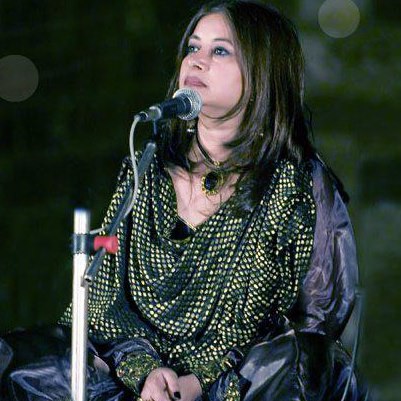
Rekha-ji muses, “An artist’s life is never complete with interacting with the audience and singing live. Thanks to playback, live singing becomes fun. The advantage of playback is singing is that it is an enclosed studio where there is the scope of improvising. In fact, the voice that is translated through the mic is very different. While singing live, the audience gives you instant reaction and transmits energy that I thoroughly enjoy. I think I am more of a stage person.”
She continues, “Having said that, I also feel my voice is suitable for playback singing. It is a lot of fun now because after singing for so long I feel I have become seasoned. Singing popular film songs increases your reach among the audience. Since I have so many popular songs to my name, people also like to listen to my thumris and other Sufi songs. I feel very fortunate that I am able to sing so many different genres. My audience has become very strong and the blessings I get from people are very satisfying. It is all thanks to the almighty!”
With a tour in the United States of America scheduled for June, Rekha Bhardwaj is all set to release some new work. “Currently we are working on albums. Vishal has composed Dr. Bashir Badr saab’s nazme as a personal tribute to him. He will sing a few of them while I will sing the rest. However, he is keeping really busy and hence we will be releasing individual songs by the next month. Apart from this, I am also working on an album with bandishes that I have composed myself”.
Rekha-ji considers Lata Mangeshkar as her idol and tries to learn from her singing and preparation style. An ardent lover of her Ruhani guru, Madhurani Faizabadi, Mehndi Hasan, Jagjit Singh, and Begum Akhtar Sahiba among others, she firmly believes her riyaaz keeps her going and that music continues to be her lifeline.
Liked reading this? Then you might also like to read Vidhya Kalyani Ramasubban – Offering Dignified Transportation To The Differently Abled With Kickstart Cabs
If there’s any story that needs to be told, we will tell it. Write to us at contact@knowyourstar.com with your story lead, or contact us on Facebook or Twitter.